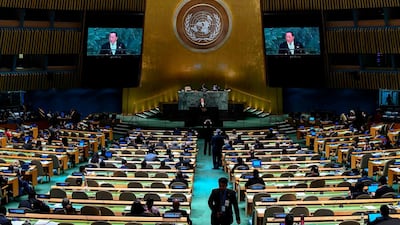Nuclear weapons have always been on the agenda at the United Nations. The organisation came into inception after the end of the Second World War and the destruction wrought by it – including the first use of a nuclear bomb. The UN was established to prevent that from ever happening again.
The five permanent members of the UN Security Council all have them and yet have pledged to stop their proliferation. The use of Chapter VII resolutions from the UN – that is the legally authorised use of force to enforce its decision – is the main mechanism to deter countries from developing or using weapons of mass destruction, be they nuclear, chemical or biological.
International efforts have had mixed results, from Israel to Libya. At this year’s UN General Assembly, the issue of proliferation features again, with a focus on Iran and North Korea. US President Donald Trump is slated to chair a meeting of the UN Security Council – a first for him – which will focus on non-proliferation. Iran’s nuclear programme and the need for a permanent solution to it will be key, in addition to efforts to combat the use of chemical weapons in Syria.
While concerns on Iran are not limited to its nuclear programme, any attempts to find a viable solution with Iran will rest on checking its nuclear capabilities. This week’s meetings at the UN and on the assembly sidelines will include American efforts to have a more comprehensive approach to dealing with Iran.
Criticism has been directed at the American administration’s tough approach to Iran, a marked departure from the administration of Barack Obama, who used the second term of his administration to reach out to Tehran. However, Mr Trump's approach has worked in North Korea.
_______________
UNGA 2018:
Everything you need to know about the 73rd Session of the UNGA
Donald Trump tackles Middle East at UN General Assembly, but few breakthroughs expected
Donald Trump to support plan for 'Arab Nato'
_______________
A collective gasp followed Mr Trump’s statement during his speech at the General Assembly last year that "the United States has great strength and patience, but if it is forced to defend itself or its allies, we will have no choice but to totally destroy North Korea". His forceful attitude pushed diplomats to work extensively to avoid a confrontation.
A similar tactic with Iran has not yet yielded results, in part because Tehran is banking on European and Chinese support to maintain the nuclear deal. However, diplomats are meeting in New York before the next round of US sanctions hit Tehran in November and calculations may just change.
Meanwhile, US Secretary of State Mike Pompeo will chair a meeting on North Korea on Thursday. Progress towards denuclearisation there is expected to be declared, while obstacles remain for full implementation. Tangible results on that nuclear file will be watched carefully this week as a case study for the future of non-proliferation diplomacy. The world’s efforts to curb nuclear weaponisation may rest on it.

